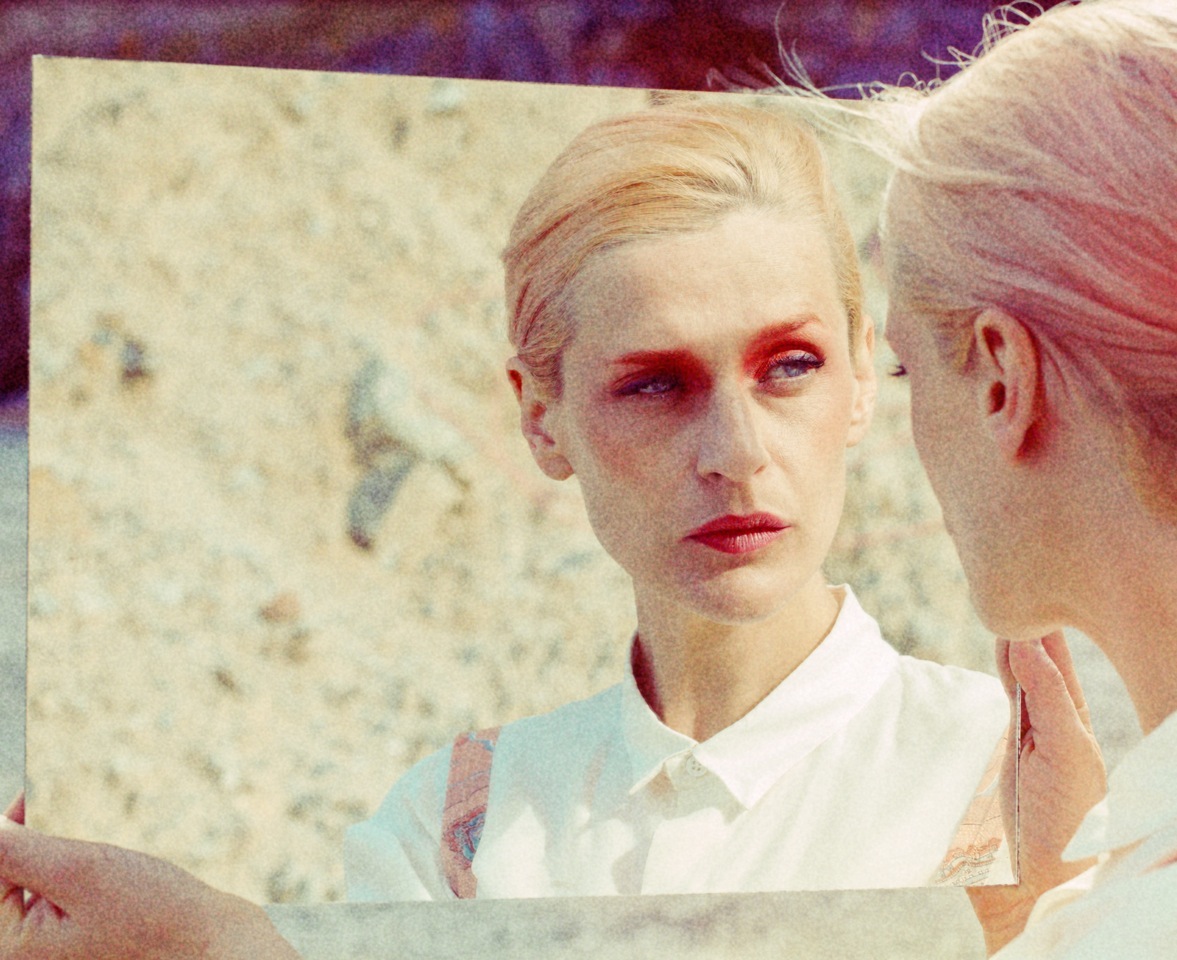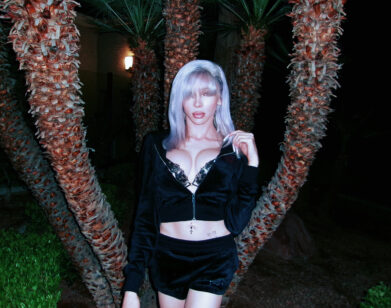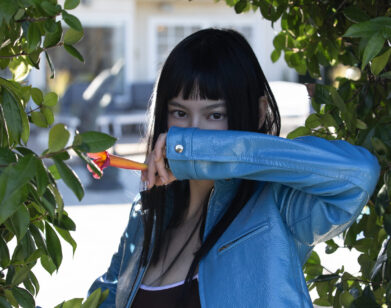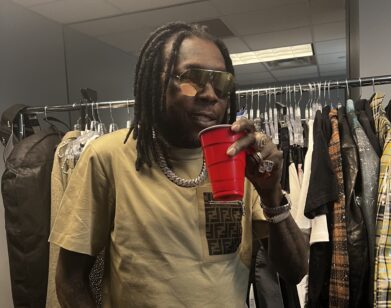Exclusive Remix Premiere and Interview: Chad Valley x El Perro Del Mar
Despite sharing an affinity for Balearic beats and pseudonyms, Sarah Assbring (El Perro Del Mar) and Hugo Manuel (Chad Valley) are not the most obvious musical companions. Over her previous three albums, Assbring has proven herself to be a melancholy chameleon, transitioning from the David Lynchian pop of her self-titled debut, to the hushed meditations of From the Valley to the Stars, to dance-it-out breakup songs of Love is Not Pop. Assbring’s fourth album Pale Fire (out November 13 via Control Group) continues her trend of reinvention. Across ten tracks, icy synths cinematically accented with spoken word samples sit side-by-side with dark dance pop refrains, light reggae beats, and Assbring’s bittersweet voice.
As proven with previous EPs Chad Valley and Equatorial Ultravox, Manuel’s is a hazy world of carefree beach-bum chic. His debut full-length, Young Hunger (Cascine), gently pushes his sound into the club on a tidal wave of George Michael-worthy synths, drum machines, and the occasional 1990s lyrical reference. Assuring that his dance floor is always packed, Manuel invited a few friends to guest on the record, including Twin Shadow, Active Child, and Glasser. Even though they’ve never met face-to-face, Assbring accepted Manuel’s request to collaborate with him on Young Hunger‘s feathery dance-driven duet, “Evening Surrender.” The song is a bridge between the two musicians’ night and day worlds: Assbring’s crystalline soprano is a near-perfect foil for Manuel’s rich falsetto, faux-pan flutes, and after-hours swagger.
Interview joined Assbring and Manuel for their first-ever Skype conversation. From their home bases in Stockholm, Sweden, and Oxford, England, the pair discussed renaming themselves, the joys (and perils) of working alone, and what might be next. We’re also pleased to debut an exclusive Chad Valley remix of El Perro Del Mar’s “Walk On By,” below. —Laura Studarus

HUGO MANUEL: I can’t remember how I heard your first album. I heard the “God Knows” song first. I fell in love with it straight away. That album for me became one of my favorite albums of the year and of the last 10 years. From that moment, I’ve listened very intently to everything that you’ve made.
SARAH ASSBRING: Oh wow, I’m honored. I think I heard your music for the first time a couple of years back when a friend recommended it to me. I also fell in love completely with your world of sound, and atmosphere, and your way of writing melodies. So I was really, really happy when you got in touch with me to do this duet. It was really lovely.
MANUEL: I was approaching a lot of people for this album. I don’t think anyone I approached had heard of me before.
ASSBRING: Really?
MANUEL: Yeah, it was like, “Okay, you can send me some stuff, and I’ll have a listen.” So that’s really cool! I was thinking about similarities between our two projects. We’re very different. You’re a lot more established. You’re on your fourth album now. I’m just about to release my first. But we’re both solo artists, and we’re both solo artists that have chosen to have a pseudonym. I’ve never really thought about the fact that you’ve done the same thing as me.
ASSBRING: I don’t think I ever really considered using my own name. It doesn’t have anything to do with my funny last name, which everyone likes to point out. [laughs] I just felt like having a pseudonym would give me a lot more freedom. To me, it felt like a perfect umbrella to just be able to do whatever music I wanted. I knew that I would keep pushing my music and I would probably not sound the same with every record. For me, it stood for being able to be free in a way that I don’t think I would if I used my own name. How do you feel?
MANUEL: I was going to say pretty much the same thing, really. People think my name is actually Chad Valley—sometimes people are surprised that it’s not my name, and then they ask why I don’t use my own name. Hugo Manuel is a really cool name. I never even considered it because of similar reasons. I wanted to explore so much different stuff that I felt like if it were under my own name it would be the definitive, “This is what Hugo Manuel does.” I think that’s important. It felt really unnatural to use my own name.
ASSBRING: It’s a way to be bigger than yourself. It’s like escapism. You’re trying to build a world around yourself and around your music. For me, it has a lot to do with that as well.
MANUEL: Do you think you’ll ever start any other projects or make music under your own name?
ASSBRING: That’s an interesting question. It’s really strange for me, because I tend to change in my ideas and thoughts, and I tend to feel like if I have an idea one month, I feel a month later that it’s really out of date and it feels old to me. I feel like I want to do something that’s totally different. But with El Perro Del Mar, I feel like for some reason it just sticks, it just stays on me. I’m very happy to feel like that. It still feels the same way that it felt when I started out. I still feel like, in the end, I would probably choose El Perro Del Mar with every different thing I would do. How do you feel?
MANUEL: I like that fact that you’ve changed a lot in your music, but you’ve managed to keep it all in the realm of El Perro Del Mar. It all fits together in that. This afternoon, I was going over all your albums in order. I had never really done it before. It’s a really interesting progression. When you were making your first album, did you think in four albums time you’d be doing such electronic stuff?
ASSBRING: When I work on an album, I go all in with the ideas that I have and the visions that I have. I did that on the first album, and I did it on all the other albums as well. I live with that vision. I run it as far as I can. I’m usually so fed up, not in a bad way, but I feel like I’ve done it as far as I could. To survive and feel like I have a need for music, or a need to express myself again, I just have to move on. But I always listen to all kinds of music. I don’t think that the person I was back then would have been surprised that I’ve progressed in the way that I have.
MANUEL: If you ever listen to your old albums, does it feel foreign to you?
ASSBRING: It does feel like I am a different person. Definitely. It feels like I’m listening to my younger sister or something like that. I still feel very happy when I listen to it. One of the things that I feel happy about is that I was always as true as I possibly could be, to myself and the music that I wanted to make. I don’t compromise—which is one of the things that I usually get beaten up for. When I listen to my older records, I’m quite happy in the end that I was that stubborn and that I stuck it through.
MANUEL: Difficult to work with. That’s something that I get accused of a lot.
ASSBRING: Really?
MANUEL: Yeah, I’m terrible to work with generally. You’re lucky that we weren’t in the studio together. I probably would have ruined your loyalty. Do you think you’re like that as well? Or is that just what people say?
ASSBRING: No, I think I’m horrible in the studio to work with. It’s a tricky thing. I don’t know how you work or what you feel is your way of being horrible—but the way I am, I’m both a dictator and at the same time, if I come to a situation that I can’t be a dictator, I tend to adjust too much. I get lost in what my ideas really are. In that sense, I feel I have to choose the solitary way that I tend to work. Because that’s the safest way for me to keep my ideas clear. Or else I will become a horrible person and feel really bad. What do you feel about yourself in a recording situation with other people?
MANUEL: With Chad Valley, I’ve never worked with anyone. When it came around to the new album, it was suggested to me—it wasn’t my idea at first—to work with a producer. My first thought was, “No way.” I can’t even perceive doing that. I’m happy with what I’ve made. I’ve done two EPs. I think they sound great, I can’t even imagine it. I slowly came around to the idea as I started writing the demos. I started to realize that what I wanted to do in terms of production, I didn’t really know how to do. I wanted to make something that was incredibly clear and the opposite of everything I had tried to do before. I tried to make music that was as hazy and washed-out as possible. So I worked with a producer. It was really hard! I know exactly what I want in my head. If I sat behind the desk and I knew everything, I’d be able to make it happen. But having that barrier to express what you want and explain in words, explain it to someone else, and have them do it for you, it’s a very unnatural thing to do.
ASSBRING: So how did it go in the end, did you finish it off?
MANUEL: I stuck it through. It was harder than I thought. It took longer than I thought it would. It’s just hearing your music changed so much. I gave this guy all the demo recordings and suddenly they sounded completely different. I was freaking out. Then we brought it back to what I wanted in the process and it became something that I exactly wanted in the first place. I don’t know much about how you’ve made any of your albums, actually. With Pale Fire, was anyone else involved?
ASSBRING: With Pale Fire, I mostly produced it myself. In the beginning, I started producing it together with Rasmus Hägg from Studio, who co-produced my last album Love is Not Pop. But then I felt kind of the same way that you expressed about your music, I felt that it wasn’t right. The music was going somewhere that I couldn’t agree with. So I kidnapped the album and decided to produce it myself. I just felt like I had a strong enough idea myself. I felt like it was going to go on too many detours on the way, and it’s going to end up somewhere completely different that I’m not willing to go. I had to do it myself.
MANUEL: Do you have any ideas on where you might go next? Or is it far too early to tell?
ASSBRING: I’m slowly starting to think about it. I think definitely I think I’m going to try to collaborate with someone next time. I was so close to doing it this time. It was definitely a rough album to make. I feel like it would be really nice to co-produce it together with someone and do it together on the next album. How do you feel about your album and making it?
MANUEL: I think I learned a lot. If nothing else, it’s a really good learning experience. It’s hard, it feels so recent. I finished a few months ago, and it’s still right there in the forefront of my mind. What always happens when I finish any album or any release, I suddenly think about what’s next. So I’m always fascinated by an artist’s progression over the years. To me it’s the most interesting thing about music. You can really get to know someone through their music, by looking at how they’ve changed over the years and how they’ve reacted to the current music climate.
ASSBRING: With Chad Valley having such an identifiable sound, do you ever get stuck with the idea that you have to evolve from album to album?
MANUEL: I worry that people expect a certain thing. I can empathize. You’ve got a favorite band, and when you hear they’ve got a new album out, you’ve got an idea in your head about what it might sound like. If they’ve done something completely different, you might be disappointed. But I think the best albums are the ones that have caught people off guard and surprised people. There’s nothing more boring than when they do their second album and everyone’s like, “Oh, you know, it’s just like the last one.” I’m pretty sure I’m going to change an awful lot, whether it’s the next album, or the album after that. But I do worry about what people will think, a lot.
ASSBRING: What about an artist like Beck, who kept doing the same thing from album to album until he felt trapped by his need to keep doing something different?
MANUEL: He’s done a lot of albums. Maybe that’s going to happen 15, 20 years down the line. [laughs] I think he’s in a very different place from myself or you. It must be very hard to have been an artist for 20 years. People listening very hard to everything that you do. I hope that I get to that stage, but it would definitely scare me, because that’s a lot of weight on your shoulders to carry.
ASSBRING: Yeah, definitely. Also, it depends on why the need for change. Why you’ve decided that you need to evolve. I do that because there’s no other way for me. It’s an unconscious thing. It’s not something that I’ve set out to do and decided for myself. It’s just necessary for me. It’s the only way that I can keep doing music. If you’re doing it as a gimmick or something, every record has to be a funky new way of sounding, “What’s he gonna do this time?,” then you’re easily trapped in it. But as you say, Hugo, having done so many albums, I guess it’s bound to end like that. I have no idea how I will feel. I’ll probably sit there with my acoustic guitar, doing simple songs down the line, and thinking that’s extremely meaningful and lovely.
MANUEL: I’ve got a real hankering desire to make a country rock album.
ASSBRING: Oh yeah?
MANUEL: Yeah, in my later years. When I’m in my mid-40s, late 40s, I’m going to crack out the country rock. I’ve always been a big fan, and I’ve never really found the place to do that.
ASSBRING: I can see you doing that, actually!
MANUEL: I’ll do it. It won’t be for a while, so don’t hold your breath. [laughs] Maybe if I start writing the songs now, in 30 years’ time they’ll be finished. I can retire as a country rock star.
ASSBRING: It would work perfectly with your name as well. [laughs] Both of them.

MANUEL: I’d also love to do something together with you again.
ASSBRING: Me, too. I think I could do it so much better. I had been really sick for a really long time when I recorded. I just felt like, “Damn! I should be better!” So I would love to. I would really love to do it. I love the way that you write duets.
MANUEL: I didn’t write it initially thinking I was going to write a duet. As soon as that second verse came around, I could only think of it being a girl singer. It had to have been. Maybe in the future we can do a collaboration where it’s actually writing together. That would be interesting. Maybe because we’re both terrible to work with other people.
ASSBRING: That would be really interesting, yeah! [laughs]
MANUEL: We’d end up hating each other. Maybe the opposite would happen.
EL PERRO DEL MAR’S PALE FIRE IS OUT NOVEMBER 13. FOR MORE, VISIT HER WEBSITE. CHAD VALLEY’S YOUNG HUNGER IS OUT TODAY. FOR MORE, VISIT HIS TUMBLR.







